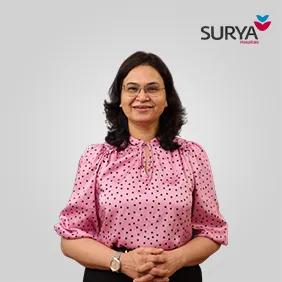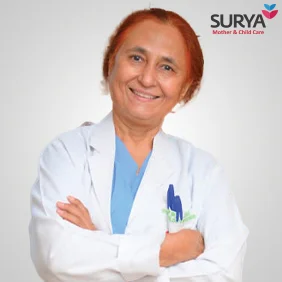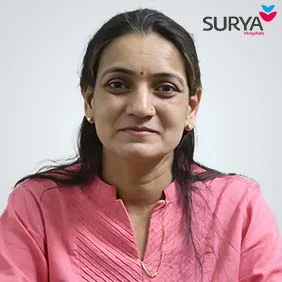Best Gynecologist in Jaipur at Surya Hospital
The Gynaecologists at Surya Hospital are committed to providing exceptional care to cater to the varied health needs of women from all age groups - be it your mother, sister, wife or even daughter. The excellence of women care in Surya Hospital is backed by a highly qualified and skilled team of doctors who are the top gynecologists. These doctors hold years of experience in the field. From preserving sound reproductive health to diagnosing, preventing and treating a wide gamut of gynecological problems, they hold expertise in the management of the most complex medical conditions. At Surya Hospital, gynecologists are well-versed with the latest imaging modalities such as MRI, CT and ultrasound, that help to thoroughly evaluate & assess each patient, with added precision and accuracy to develop treatment plans to ensure optimal outcomes. When it comes to surgical excellence, the gynecologists in the hospital are specialized in both conventional, as well as laparoscopic interventions.
What is the Education Qualification of a Gynaecologist/Obstetrician?
- 5-years MBBS degree (Bachelor of Medicine and Bachelor of Surgery)
- 2-years Postgraduate Diploma in Gynecology and Obstetrics
- 2-years Master of Surgery (M.S.) in Gynecology
- 3-years Diplomate of Medicine (D.N.B.) in Gynecology
- 3-years Doctor of Medicine (M.D.) in Gynecology
- Fellowships
How is an Obstetrician Different From Gynecologists?
Although these medical specialties are distinct, obstetrics and gynecology are taught together during residency. What distinguishes gynecology from obstetrics? A medical professional with an interest in OB/GYN can choose to specialize in either obstetrics or gynecology.
Obstetricians treat both the mother and the fetus during pregnancy, deliver babies, and assist moms in recuperating from the psychological and physical stresses of giving birth. A doctor of obstetrics does not treat patients after pregnancy. Conversely, gynecologists do not treat or deliver babies during pregnancy. Rather, they concentrate on the condition of the fallopian tubes, ovaries, uterus, and other female reproductive system organs. In order to treat a patient, both obstetricians and gynecologists can prescribe medication or do surgery.
However, the majority of OB/GYNs choose to practice both obstetrics and gynecology, and numerous OB/GYNs work as primary care doctors. Many patients stick with the same OB/GYN for a number of years, which facilitates the growth of dependable interpersonal connections. OB/GYNs perform surgeries, diagnostic tests, and various treatments in addition to providing patient advice.
What Diseases Does a Gynaecologist/Obstetrician Treats?
Following are the issues that Gynaecologists/Obstetricians treat:
- Endometriosis
- Uterine fibroids
- Ovarian cysts
- Vaginal infections
- Cancer of reproductive organs
- Pelvic pain
- Irregular menstrual bleeding.
- Menopause
- Menstruation problems
- Lumps or boils in your vagina or on external genitalia
- Reproductive hormone imbalances in women
- Unwanted pregnancy
- Infertility in women
- STIs
- Urinary & fecal incontinence
- Polycystic ovary syndrome
- Breast disorders
- Vulvar & vaginal ulcers
- Other non-cancerous lesions
- Premalignant conditions, including endometrial hyperplasia & cervical dysplasia
- Reproductive tract cancers
- Breast cancer
- Pregnancy-related tumors
- Congenital abnormalities associated with female reproductive tract
- Pelvic inflammatory diseases
- Abscesses
- Sexual dysfunction
What Procedures or Surgical Interventions are Offered by Gynaecologists/Obstetricians?
Following are procedures or surgical interventions are offered by Gynaecologists/Obstetricians:
- Abortion
- Childbirth
- Prenatal care
- Colposcopy
- Amniocentesis
- Contraception
- Genetic screening and testing
- Family planning
- Hysterectomy
- Hysteroscopy
- Infertility management
- Laparoscopic surgery
- Menopause management
- Oncology care for breast or reproductive organ cancer
- Pap test
- Preventive care
- Reproductive endocrinology
- Reconstructive surgery
- Medical care for sexually transmitted diseases
- Umbilical vein sampling
- Ultrasonography
- Adhesiolysis
- Cervical (Cone) Biopsy
- Colporrhaphy
- Dilation and Curettage (D&C)
- Endometrial Ablation
- Endometrial or Uterine Biopsy
- Fluid-Contrast Ultrasound (FCUS)
- Myomectomy
- Oophorectomy
- Pelviscopy (Pelvic Laparoscopy)
- Selective Salpingography
- Toluidine Blue Dye Test
- Trachelectomy
- Tubal Ligation
- Uterine (artery) Fibroid Embolization (UFE)
- Vulvectomy
What Emergencies are Handled by Gynaecologists/Obstetricians?
Following are the gynecological emergencies:
- Acute Pelvic Pain
- PV Bleeding
- Ectopic Pregnancy
- Miscarriage
- Threatened Miscarriage
- Pelvic Inflammatory Disorder
- Dysfunctional Uterine Bleeding
- Certain Ovarian Pathology
How to Choose the Best Gynaecologist/Obstetrician?
You should find the right OB-GYN for your reproductive, sexual, emotional, and physical well-being. The following advice will assist you in selecting the top gynecologist or obstetrician:
- If you have health insurance, the details of your policy should list the OB-GYNs in your area that are covered by your plan. Choose your gynecologist from the list.
- Your friends, family, and coworkers may be excellent sources for recommending an OB-GYN that's most suitable for you. Since they are familiar with you, they probably know exactly the kind of doctor you would like.
- You can learn a lot about a doctor's communication style, qualification, experience, and expertise from social media or apps.
- If you require emergent care then you must choose the best Gynaecologist/Obstetrician who is well known in your area. On the other hand, you can choose your doctor irrespective of the region if you don’t require emergent care. In such a scenario, the doctor’s expertise should be preferred.
- Look for the hospital in which those doctors are working to check if those hospitals have the good infrastructure and your insurance policy coverage.
- Women are more susceptible than men to mental health issues, particularly during significant life transitions like adolescence, pregnancy, the postpartum phase, and menopause. It's critical to collaborate with an OB-GYN who understands the value of mental wellness. In order to prevent, identify, and successfully treat depression and anxiety when needed, it is beneficial to have a doctor who will check you for these symptoms on a regular basis. You should see an expert who can support you in managing your mental health and well-being at every stage of your life.
What are the Characteristics of a Good Gynaecologist/Obstetrician?
The Gynaecologist/Obstetrician must have following characteristics:
- Highly recommended by your near and dear ones
- Friendly
- Approachable
- High patient satisfaction ratings & great reviews
- Ability to deliver quality of care
- Ability to provide advanced care
- Ability to use latest techniques and equipment
- More years of experience
- High expertise of delivering care you need
- Similar values as well as beliefs
.jpg)
 Surya 282-282 copy.webp)


.jpg)



.webp)
